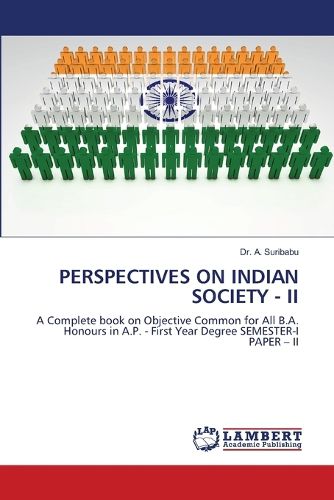Readings Newsletter
Become a Readings Member to make your shopping experience even easier.
Sign in or sign up for free!
You’re not far away from qualifying for FREE standard shipping within Australia
You’ve qualified for FREE standard shipping within Australia
The cart is loading…






Perspectives on Indian Society-II offers readers a clear and comprehensive understanding of the multifaceted aspects of Indian society, culture, and economy. Employing a multidisciplinary approach, this book encourages exploration of the interconnected social, cultural, historical, economic, and technological dimensions shaping modern India.The book is organized into five units. Unit 1 examines the relationship between individuals and society, focusing on human nature, the role of social groups, and the balance between individualism and collective values. Unit 2 delves into India's rich cultural heritage and its struggle for freedom, exploring classical arts, yoga, nationalism, and key events like the integration of princely states.Unit 3 discusses the Indian Constitution, highlighting its philosophical principles, fundamental rights, and directive principles. Unit 4 introduces the Indian economy, exploring financial institutions, economic policies, and the impact of reforms like liberalization and globalization. Finally, Unit 5 addresses the role of technology, covering social networks, data management, and artificial intelligence.
$9.00 standard shipping within Australia
FREE standard shipping within Australia for orders over $100.00
Express & International shipping calculated at checkout
Perspectives on Indian Society-II offers readers a clear and comprehensive understanding of the multifaceted aspects of Indian society, culture, and economy. Employing a multidisciplinary approach, this book encourages exploration of the interconnected social, cultural, historical, economic, and technological dimensions shaping modern India.The book is organized into five units. Unit 1 examines the relationship between individuals and society, focusing on human nature, the role of social groups, and the balance between individualism and collective values. Unit 2 delves into India's rich cultural heritage and its struggle for freedom, exploring classical arts, yoga, nationalism, and key events like the integration of princely states.Unit 3 discusses the Indian Constitution, highlighting its philosophical principles, fundamental rights, and directive principles. Unit 4 introduces the Indian economy, exploring financial institutions, economic policies, and the impact of reforms like liberalization and globalization. Finally, Unit 5 addresses the role of technology, covering social networks, data management, and artificial intelligence.